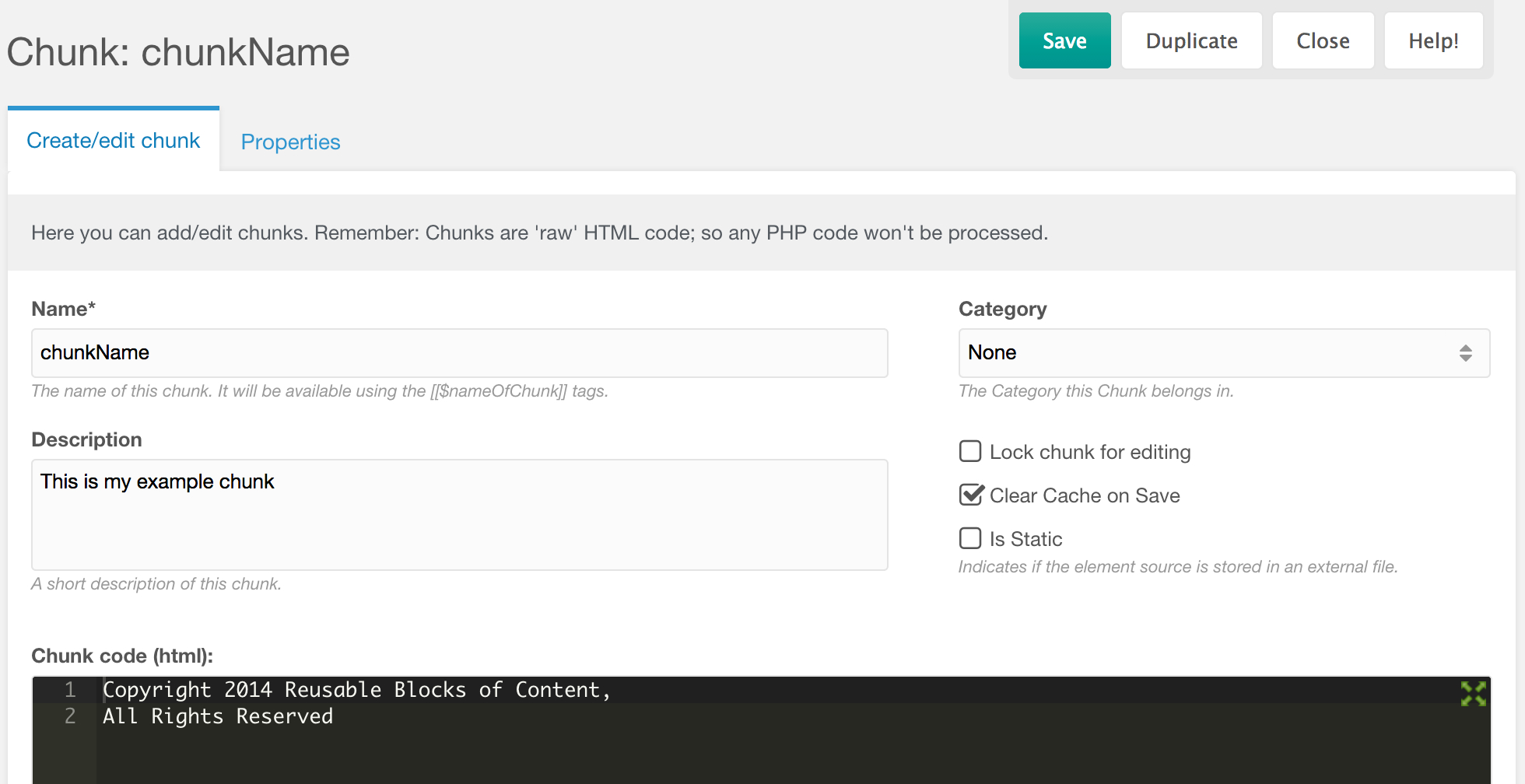Chunks
Last updated May 14th, 2019 | Page history | Improve this page | Report an issue
Support the team building MODX with a monthly donation.
The budget raised through OpenCollective is transparent, including payouts, and any contributor can apply to be paid for their work on MODX.
Backers
Budget
$293 per month—let's make that $500!
Learn moreChunks are bits of static text which you can reuse across your site, similar in function to include files or "blocks" in other content management systems. Common examples of Chunks might be your contact information or a copyright notice. Although Chunks cannot contain any logic directly, they can however contain calls to Snippets, which are executable bits of PHP code which produce dynamic output.
Create¶
Before you can use a Chunk, you must first create and name one by pasting text into the MODX manager (Elements --> Chunks --> New Chunk):

Usage¶
To use the Chunk, you reference it by name in your templates or in your page content.
[[$chunkName]]
That reference is then replaced with the contents of the Chunk.
You can also pass properties to a Chunk. Say you had a chunk named 'intro' with the contents:
Hello,
[[+name]]. You have[[+messageCount]]messages.
You could fill those values with:
[[$intro? &name=`George` &messageCount=`12`]]
Which would output:
Hello, George. You have 12 messages.
You could even take it one step further, by adding a Template Variable that allows the user to specify their name per Resource:
[[!$intro? &name=`[[*usersName]]` &messageCount=`[[*messageCount]]`]]
or in the Chunk itself:
Hello, [[*usersName]]. You have [[*messageCount]] messages.
Processing Chunk via the API¶
Chunks are also frequently used to format the output of Snippets. A Chunk can be processed from a Snippet using the process() function; for example, given the following Chunk named 'rowTpl':
<tr class="[[+rowCls]]" id="row[[+id]]">
<td>[[+pagetitle]]</td>
<td>[[+introtext]]</td>
</tr>
the following Snippet code retrieves it and processes it with an array of properties for all published Resources, and returns formatted results as a table, setting the class to "alt" if for even rows:
$resources = $modx->getCollection('modResource',array('published' => true));
$i = 0;
$output = '';
foreach ($resources as $resource) {
$properties = $resource->toArray();
$properties['rowCls'] = $i % 2 ? '' : 'alt';
$output .= $modx->getChunk('rowTpl',$properties);
$i++;
}
return '<table><tbody>'.$output.'</tbody></table>';
Modifying a Chunk Via the API¶
Chunks can also be manipulated by the MODX API:
<?php
/* create a new chunk, give it some content and save it to the database */
$chunk = $modx->newObject('modChunk');
$chunk->set('name','NewChunkName');
$chunk->setContent('<p>This is my new chunk!</p>');
$chunk->save();
/* get an existing chunk, modify the content and save changes to the database */
$chunk = $modx->getObject('modChunk', array('name' => 'MyExistingChunk'));
if ($chunk) {
$chunk->setContent('<p>This is my existing chunks new content!</p>');
$chunk->save();
}
/* get an existing chunk and delete it from the database */
$chunk = $modx->getObject('modChunk', array('name' => 'MyObsoleteChunk'));
if ($chunk) $chunk->remove();
?>
See Also¶
Support the team building MODX with a monthly donation.
The budget raised through OpenCollective is transparent, including payouts, and any contributor can apply to be paid for their work on MODX.
Backers
Budget
$293 per month—let's make that $500!
Learn more











